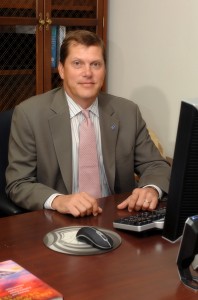By Barbara Mulligan

George Watson '77
Known for his work on engaging students in their learning and in transforming undergraduate education, George H. Watson ’77 is the new dean of the College of Arts and Sciences at the University of Delaware, where he has received several teaching awards including Delaware Professor of the Year.
In his college days,Watson was an introvert who loved solving difficult physics problems. Fast forward more than 30 years, and he’s still solving problems — and advocating their use in instruction — but in a role that has transformed his way of interacting with the world. He has worked with institutions of higher education in 20 countries and more than 30 schools in the United States during the past 12 years.
“I took a risk and got involved,” he says. “It changed my career.”
These days, Watson rarely confines himself to a lab; he shut his own research down last summer. His oversight of 22 departments, 20 programs, and more than 570 faculty members in the arts, humanities, social sciences, and natural sciences, leaves little time.
In addition to meeting with and motivating all those professors, Watson has been attending a wide range of social and cultural events. The activity is a far cry from his student days, when he preferred study and research over socialization. It’s even farther from his roots as the first member of his family of dairy farmers to attend college.
Watson, who grew up in a rural area near Shippensburg, Pa., earned his B.S. degree in physics from Lafayette and his doctorate from the University of Delaware before completing postdoctoral research at AT&T Bell Laboratories in Murray Hill, N.J.
When he joined the UD faculty in 1987, his instructional methods were traditional — lectures and standard laboratory experiments. His research was focused on experimental condensed matter physics with an emphasis on light scattering and laser spectroscopy.
“I considered myself, as a lot of professors do, to be a very good lecturer,” Watson says. But he found himself looking for more and better ways of teaching, even when those methods took him out of his comfort zone.
Over the years, he began attending seminars and workshops about problem-based learning — an instructional method that promotes hands-on investigation and resolution of real-world problems.
Watson’s deep interest in the subject led him to become the founding director of the Institute for Transforming Undergraduate Education, which promotes change through faculty development and course design. In 2004, he co-founded the Pam-American Network for Problem-Based Learning and continues to serve in a leadership role.
Watson, who became Unidel Professor of Physics and Astronomy, was named associate dean of the College of Arts and Sciences in 2001 and interim dean in 2009. He became dean on April 1. He is also principal investigator of the National Science Foundation’s “Improvement of Science Education in Vocational Technical High Schools through Collaborative Learning and Co-teaching,” project, in partnership with New Castle County Vocational Technical School District.
In each year of this project, up to nine doctoral students in the sciences are supported full-time as fellows, and paired with local high school science teachers.
Watson is also principal investigator on an ALO/USAID project to reform science and math education in Perú, has participated in problem-based learning workshops at Lafayette and other colleges and universities, and currently is working on a new science and engineering curriculum involving real-life issues such as alternative energy. The curriculum is set to be introduced by 2013, when a new science and engineering building is completed at the university.
Having the ability to be open to new experiences Watson says was developed during his years at Lafayette, when he conducted undergraduate research with Professor David Hogenboom.
“I wanted to have my own lab, and that meant graduate school,” he says. Hogenboom helped him explore options and understand what graduate school would entail. Watson says that he was very well-prepared.
“As I look back on it, there were critical times in my career, when I just made the right decision,” Watson says. “It was just staying open to the opportunities to work more broadly in the community.”
He adds that his early development at Lafayette has been important as well. “Having that traditional experience at a liberal arts college really influences my work here today,” he says. “I know what we’re looking for as an undergraduate experience … It’s hard to replicate that, but we’re trying.”
